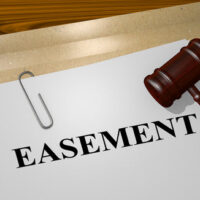Florida Real Estate Law: Understanding Easements

No matter whether you own personal or commercial real estate in Florida, you need to understand what easements are and how they can affect your rights as a property owner in the state. Generally speaking, an easement is the right to enter someone else’s land despite not having an ownership interest in it.
Easements can be complicated, so it’s best to speak with a skilled West Palm Beach real estate attorney who can explain your particular legal situation. If you believe your land is affected by an easement or someone is challenging an easement you benefit from, contact the Law Offices of Larry E. Bray, P.A. today.
Types of Florida Easements
Some of the most common types of easements are for utility services. These include water and sewer lines, power, and telephones. A property that is served by public utilities will have an easement in gross. Where these become complicated is when utilities are underground, for example, and you want to build a pool. Easements in gross typically cannot be assigned, sold, or inherited by the one benefitted.
There is something called an easement appurtenant, which provides benefit to an adjoining piece of land, regardless of who owns the land. This easement is for the benefit of a specific parcel of land, and that means there must be dominant and servient tenements. The land that benefits from the easement is the dominant tenement while the servient tenement is the one who is burdened by it.
The law also recognizes something called a prescriptive easement, which is when an individual uses someone else’s land for a certain amount of time. These are not covered by statute like other types of easements, and exist under common law. There are a number of certain conditions that must be met for a prescriptive easement, including that the individual has to have used the land continuously for at least 20 years and the use is limited to a defined route or area. Your Florida real estate attorney can explain all the other conditions that must be met.
How an Easement is Created
An easement can be created through a number of different ways. The first is an express easement, which is a formal process that includes a written agreement. The agreement must be signed by both parties and typically recorded on the property deeds.
There may also be an implied grant of way when the need arises to access another parcel of land because the owner cannot get to his or her own parcel without crossing through a piece of land they don’t own, and the two pieces of land were previously part of one larger property. Florida law makes a presumption of the right-of-way in this case.
Disputes with Easements
One of the most common disputes with easements involve boundary line disputes when one of the parties wants to make improvements. Sometimes, a property owner will add a wall or fence or make some other type of modification that encroaches on the adjoining land, the owner may be told to remove the improvement or be required to pay the landowner for the easement.
Contact a Florida Real Estate Attorney
If you have questions about easements or need assistance with other real estate issues, contact the Law Offices of Larry E. Bray, P.A. in Florida at 561-571-8970 to schedule a consultation.
https://www.braylawoffices.com/florida-residential-property-short-sales/

